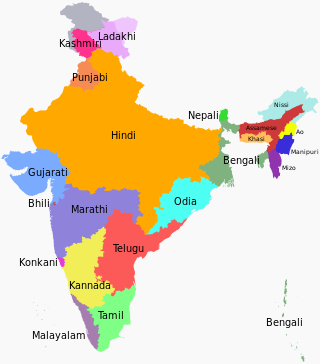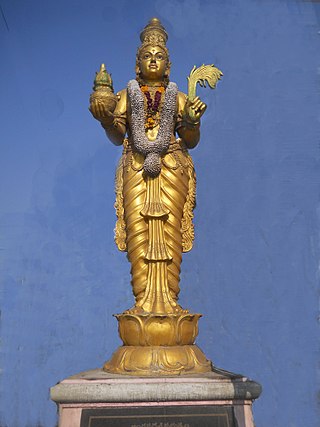
Andhra Pradesh is a state in the southern coastal region of India. It is the seventh-largest state with an area of 162,970 km2 (62,920 sq mi) and the tenth-most populous state with 49,577,103 inhabitants. It has shared borders with Chhattisgarh, Odisha, Karnataka, Tamil Nadu, Telangana and the Bay of Bengal. It has the second-longest coastline in India at about 974 km (605 mi). After existence as Andhra State and unified Andhra Pradesh, the state took its present form on 2 June 2014, when the new state of Telangana was formed through bifurcation. Amaravati is the capital of the state, with the largest city being Visakhapatnam. Telugu, one of the classical languages of India used by the majority of people, is the first official language.

The Dravidian languages are a family of languages spoken by 250 million people, mainly in southern India, north-east Sri Lanka, and south-west Pakistan. Dravidian is first attested in the 2nd century BCE, as inscriptions in Tamil-Brahmi script on cave walls in the Madurai and Tirunelveli districts of Tamil Nadu.

Telugu is a Dravidian language native to the Indian states of Andhra Pradesh and Telangana, where it is also the official language. Spoken by about 96 million people (2022), Telugu is the most widely spoken member of the Dravidian language family, and one of the twenty-two scheduled languages of the Republic of India. It is one of the few languages that has primary official status in more than one Indian state, alongside Hindi and Bengali. Telugu is one of the six languages designated as a classical language by the Government of India. It is the 14th most spoken native language in the world. Modern Standard Telugu is based on the dialect of erstwhile Krishna, Guntur, East and West Godavari districts of Coastal Andhra.

Languages spoken in the Republic of India belong to several language families, the major ones being the Indo-Aryan languages spoken by 78.05% of Indians and the Dravidian languages spoken by 19.64% of Indians; both families together are sometimes known as Indic languages. Languages spoken by the remaining 2.31% of the population belong to the Austroasiatic, Sino–Tibetan, Tai–Kadai, and a few other minor language families and isolates. According to the People's Linguistic Survey of India, India has the second highest number of languages (780), after Papua New Guinea (840). Ethnologue lists a lower number of 456.

There is no national language in the Republic of India. However, article 343(1) of the Indian constitution specifically mentions that "The official language of the Union shall be Hindi in Devanagari script. The form of numerals to be used for the official purposes of the Union shall be the international form of Indian numerals," while article 343(2) allowed for the continuation of English as an official language for another 15 years and 343(3) gave the parliament the power to provide for the use of English language after this period. The clause 3 of the Official Languages Act, 1963 allows for the continued use of English language for official purposes of the Union government and for parliamentary business. Hence Indian English and Modern Standard Hindi are the Official Languages of the Government of India.
Indian epic poetry is the epic poetry written in the Indian subcontinent, traditionally called Kavya. The Ramayana and the Mahabharata, which were originally composed in Sanskrit and later translated into many other Indian languages, and the Five Great Epics of Tamil literature and Sangam literature are some of the oldest surviving epic poems ever written.
Indian poetry and Indian literature in general, has a long history dating back to Vedic times. They were written in various Indian languages such as Vedic Sanskrit, Classical Sanskrit, Ancient Meitei, Modern Meitei, Telugu, Tamil, Odia, Maithili, Kannada, Bengali, Assamese, Urdu, and Hindi. Poetry in foreign languages such as English also has a strong influence on Indian poetry. The poetry reflects diverse spiritual traditions within India. In particular, many Indian poets have been inspired by mystical experiences. Poetry is the oldest form of literature and has a rich written and oral tradition.

Telangana is a state in India situated in Southern part of the Indian peninsula on the high Deccan Plateau. It is the eleventh-largest state and the twelfth-most populated state in India as per 2011 census. On 2 June 2014, the area was separated from the northwestern part of United Andhra Pradesh as the newly formed state of Telangana, with Hyderabad as its capital.

Telugu people, also called Andhras, are an ethno-linguistic group who speak the Telugu language and are native to the Indian states of Andhra Pradesh, Telangana and Yanam district of Puducherry. They are the most populous of the four major Dravidian groups. Telugu is the fourth most spoken language in India and the 14th most spoken native language in the world. A significant number of Telugus also reside in the Indian states of Karnataka, Tamil Nadu, Orissa, Maharashtra. Members of the Telugu diaspora are spread across countries like United States, Australia, Malaysia, Mauritius, UAE, and others. Telugu is the fastest-growing language in the United States. It is also a protected language in South Africa.

Telugu cinema, also known as Tollywood, is the segment of Indian cinema dedicated to the production of motion pictures in the Telugu language, widely spoken in the states of Andhra Pradesh and Telangana. Telugu cinema is based in Film Nagar, Hyderabad. As of 2021, Telugu cinema is the largest film industry in India in terms of box-office. Telugu films sold 23.3 crore tickets in 2022, the highest among various film industries in India.
Akkineni Sreekar Prasad is an Indian film editor known for his works across Hindi, Malayalam, Tamil, and Telugu language films. In a career spanning more than 35 years, he has edited over 600 films. He is a recipient of nine National Film Awards including seven wins for Best Editing which is a record in that category. He also won five Kerala State Film Awards, two Andhra Pradesh state Nandi Awards, and two Filmfare Awards among others.

Tamanna Bhatia, is an Indian actress who primarily works in Telugu, Tamil and Hindi cinema. She has appeared in over 80 films, and has won a Kalaimamani Award, a SIIMA Award and has received several Filmfare Awards South nominations.

Zee Telugu is an Indian Telugu language general entertainment pay television channel in India. It was launched on 12 September 2004 as Alpha TV Telugu. and was rebranded as Zee Telugu on 18 May 2005. The channel is owned by Zee Entertainment Enterprises. Zee Entertainment Enterprises also launched a Telugu movie channel named Zee Cinemalu in September 2016.

The Telugu Diaspora refers to Telugu people who live outside their homeland of Indian states of Andhra Pradesh and Telangana. They are predominantly found in North America, Europe, Australia, Caribbean, Gulf, Africa and other regions around the world. There are also few Telugus from other Indian states such as Karnataka, Tamil Nadu, Odisha and Maharashtra, who live outside India. Telugus of Andhra Pradesh origin, living outside India are often referred as Non-resident Andhras (NRA). After the bifurcation of the United Andhra Pradesh, these are popularly referred as Non-resident Telugus.

Bigg Boss is an Indian Telugu-language television reality show of the Bigg Boss franchise which airs on Star Maa and streams on Disney+ Hotstar in India. It follows the format of the Dutch reality show Big Brother, which was first developed by Endemol in the Netherlands.
Pan-Indianfilm is a term related to Indian cinema that originated with Telugu cinema as a mainstream commercial film appealing to audiences across the country with a spread to world markets. The movement gained popularity since 2015, post the success of Baahubali: The Beginning. The term "pan-Indian film" is used for a film that is simultaneously marketed and released in multiple languages across India – Telugu, Hindi, Tamil, Kannada and Malayalam. Such films make an attempt to appeal to the audiences across the country, cutting across the linguistic, regional and cultural barriers.

The official scripts of the 22 official languages of the Republic of India include abugidas (pseudo-alphabets), alphabetical writing systems and abjads.












